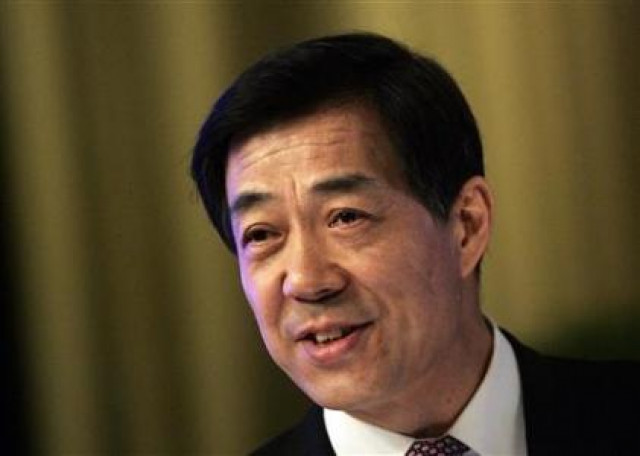China's Bo Xilai verdict to cap spectacular scandal
Scandal involves bribes, murder, illicit love, political infighting, and a colourful yet tightly controlled trial.

Bo Xilai. PHOTO: REUTERS/FILE.
Even before the stunning five-day hearing last month, the downfall of the once-powerful Bo was already the most sensational drama in decades to rock the ruling Communist Party and its prized stability.
Bo, who once ran the southwestern megacity of Chongqing, was one of China's top 25 politicians, a charismatic figure enjoying popular support but his ambition and leftist streak worried leaders.
The scandal that erupted in February 2012 - when Bo's top aide in Chongqing fled to a US consulate with evidence the politician's wife had murdered a British associate - provided the catalyst for his fall.
With factions in the upper echelons of the party reportedly split over how to handle him, a year and a half passed before Bo went to trial, becoming the most high-profile official to do so in decades.
The hearing offered a rare peek into the family life and dealings of a major politician, as the prosecution and defence jousted over charges of bribery and embezzlement totalling $4.4 million and abuse of power.
The alleged ill-gotten goods included a French villa purchased by a Chinese businessman for Bo's wife Gu Kailai through shell companies managed in part by Briton Neil Heywood, whom Gu was convicted of killing. She was jailed last year.
Bo tried to block his deputy Wang Lijun from investigating Gu's role - slapping him on the face and dismissing him from his post - which the prosecution pointed to as abuse of power
The drama of the trial was amplified as Bo - in his first appearance since the height of the scandal - seized the spotlight with a full-throated defence.
He accused Gu of being "insane" and Wang of secretly loving her while giving testimony that was "full of lies".
As a high-powered official, he argued, he could not have been expected to know about his wife's property dealings or other questionable gifts raised by the prosecution.
Bo spoke with a bluntness unheard of among senior figures.
When accused of having been heard talking over the phone about an embezzlement scheme, he hit back, saying: "It is not even what the most stupid corruption offender would do."
He admitted to having stashes of hundreds of thousands of yuan in the couple's home safe, and to extramarital affairs that drove his wife away.
Authorities allowed an unusual degree of openness for the trial, compared with typically swift criminal proceedings in which defendants say little except to plead guilty.
In another rare step, the court released partial transcripts throughout each day.
Yet, despite the appearance of transparency, the trial was stage-managed in ways that left major issues glaringly unaddressed.
Transcript excerpts were increasingly delayed as the trial progressed. No independent media were allowed in court to verify their accuracy.
The sums of money involved were far smaller than the tremendous wealth associated with top leaders, and only touched on the early years of Bo's career.
No mention was made of Bo's ties to fellow leaders. One vague reference, in which Bo hinted that on one occasion he acted on orders from above, was reportedly deleted from the texts.
Now, with the proceedings against Bo nearing an end, with the exception of any appeal, questions are being asked about where China's leadership will turn next to demonstrate their declared determination to fight official corruption even at the top.
Speculation has mounted they could take the drastic step of targeting a higher-ranking recently retired figure and Bo ally, Zhou Yongkang.
But leaders might prefer to draw a line under high-profile, potentially destabilising probes, and focus instead on badly needed economic and other reforms.
As for Bo, a guilty verdict and a lengthy jail term are all but certain.
Hong Kong's South China Morning Post reported this week that Bo had written a defiant letter from prison vowing to clear his name.
Indicating that he expects to be imprisoned, he said in the letter to family members that his name will "one day" be cleared, the SCMP said.
Although bribery involving more than 100,000 yuan can incur the death penalty, recent convicted high-ranking officials have been given at most a suspended death sentence, which is usually commuted to life in prison.



















COMMENTS
Comments are moderated and generally will be posted if they are on-topic and not abusive.
For more information, please see our Comments FAQ